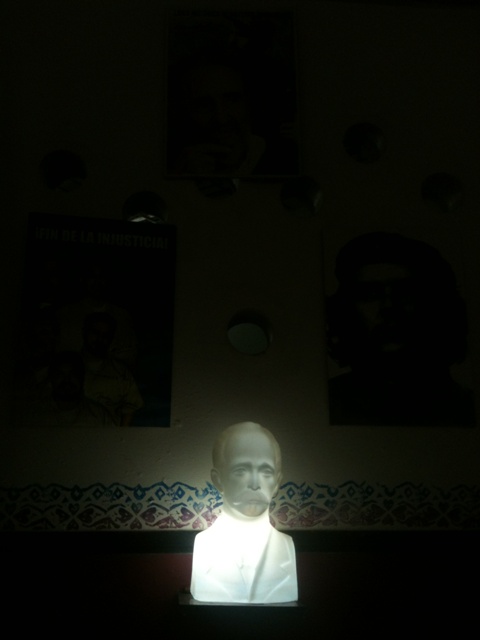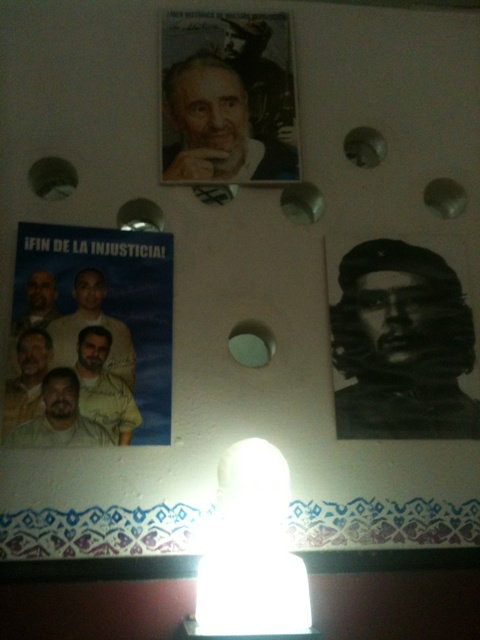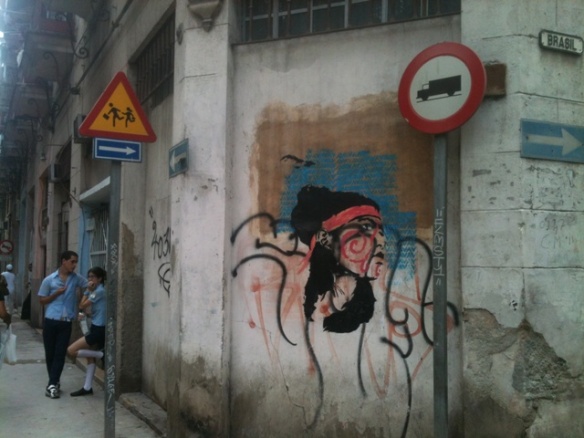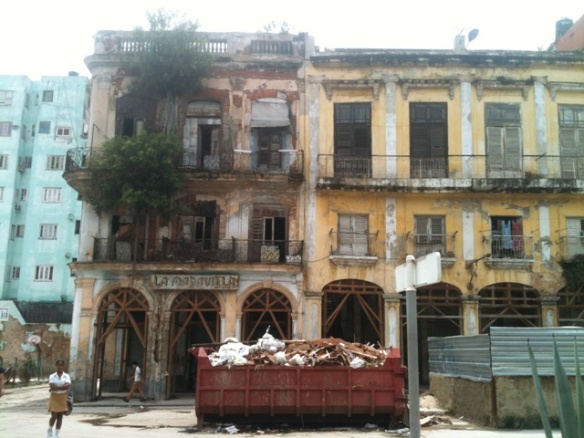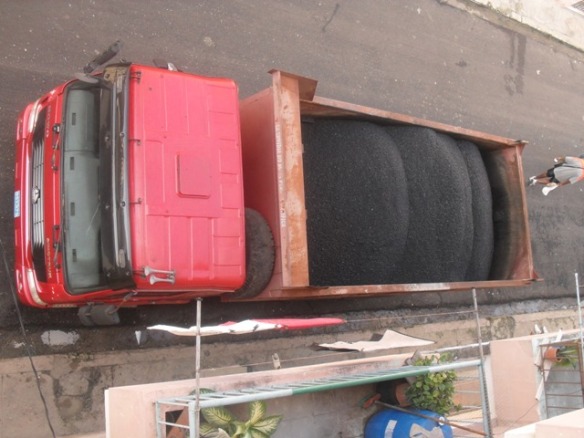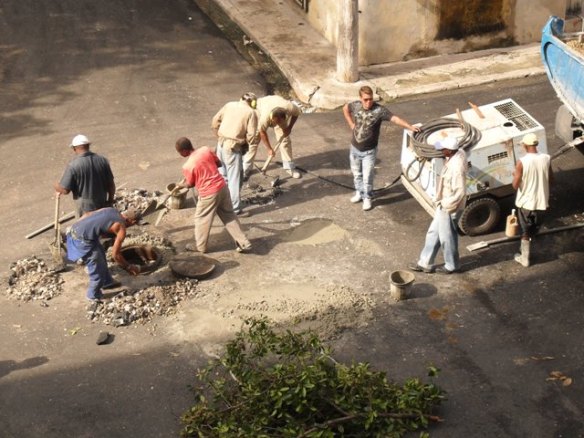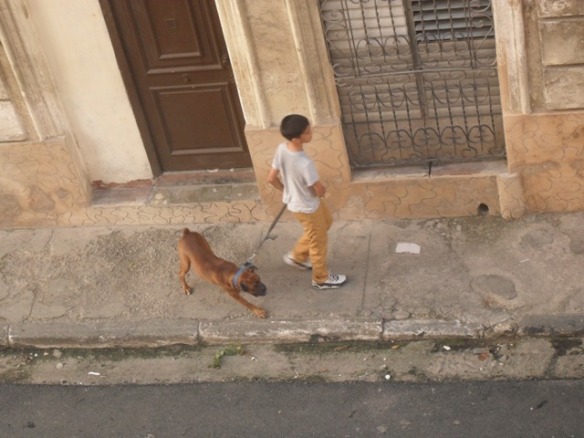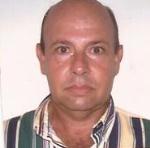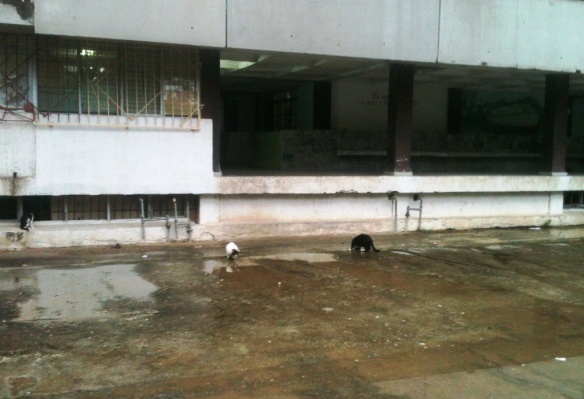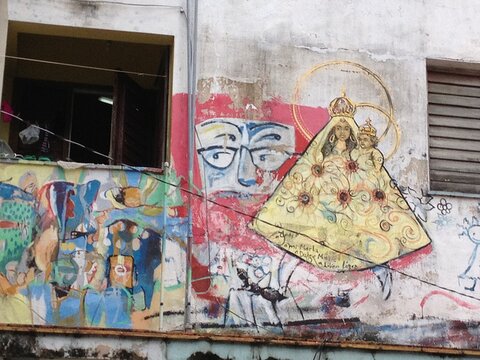Who Keeps Ernesto Borges Prisoner? / Lilianne Ruiz
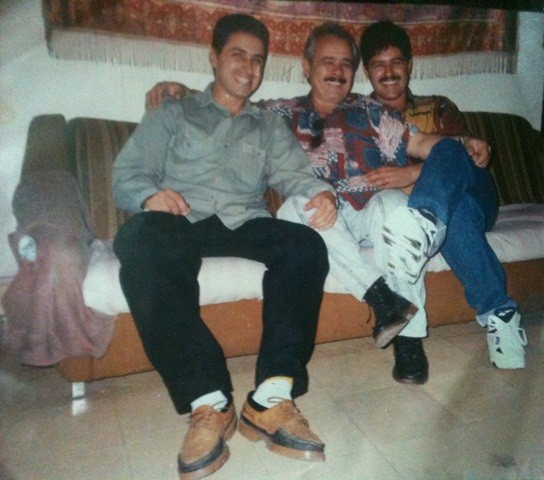
I have lost my little scissors, the ones for cutting fingernails. For a moment I thought the world had ended because here things are very well kept. A lot has to change to find good scissors, especially with the characteristics of the ones I thought I had lost.
I was still talking with a friend on the phone about that matter and Ernesto’s call came. He is the son of Raul Borges Alvarez, a well-known political dissident.
Fifteen years ago he was imprisoned for political reasons. In 1998, being still a captain of counterintelligence and analyst in that department, he collected files with classified information about more than 20 baited agents prepared for international espionage, and he tried to get them to a US official based in Havana.
The story was more or less this: He threw the files into the garden, near the front door. With a pole he managed to ring the bell but the door never opened. He was detained for a few hours, taken to Villa Marista and advised that the penalty was death. But that broke up the Wasp Network and the fact is that Ernesto thinks that is why they did not shoot him.
Five years ago he should have been on parole according to the law. Because the prosecutor recognized the family on the day of the trial as being military and having no criminal background, having been judged by a military tribunal, he would only complete a third of the 30 years to which they sentenced him.
But, although after two hunger strikes last year he received a visit from the Commission to examine his conditional release, he has received no answer. Until a few days ago he was called together with his father and brother to the office of the Combinado del Este prison, where he has spent recent years, and notified that his parole had to keep waiting.
Among the arguments given by the military of Section 21, known also as “confronting counterrevolution,” was that his father Raul Borges Alvarez attended Santa Rita in order to march near the Ladies in White, which is the Movement that most effectivtely works to make visible the situation of Cuban political prisoners, and that continued its “counterrevolutionary” activities. Because father Borges is president of a Christian democratic party.
The second argument brandished to refuse conditional release was that Ernesto Borges had carried out two hunger strikes.
Some few have achieved their liberation with that recourse of the hunger strike, others like Zapata Tamayo and Villar Mendoza (recently, because history has more examples) have died because they have let them die.
Ernesto ends the call reminding me of a quote from The Social Contract, by Rousseau, “When one man is above the law, the rights of others are in danger.” He also tells me that after the second hunger strike, last year, he received a visit from a general, Chief of jails and prisons, who told him that his case was not in his hands but at “the highest management level.” What do you think?
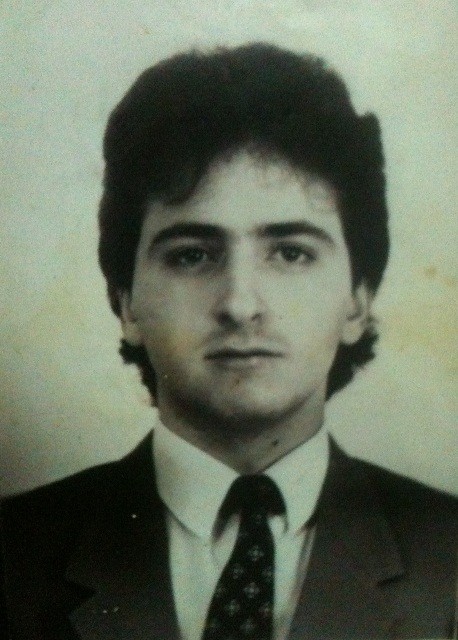
Translated by mlk
6 September 2013
The Party Hasn’t Died, It’s Rotted Alive / Jose Hugo Fernandez
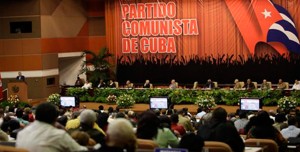 HAVANA, Cuba , September, www.cubanet.org – Out of every ten members of the Communist Youth League, when they get to the age when they should become members of the Cuban Communist Party (CCP), or, on the contrary, become politically deactivated, only two are willing to maintain their membership; and of those two, only one ends up joining the ranks of the CCP. It’s an open secret racing through Havana these days. Meanwhile, other classified information, that also passes through the gossip chain, makes it clear that the Party is down to a conga step, whether by old age or the death of its members, or the numerous requests to step down for family reunification abroad, or simply because of disappointment.
HAVANA, Cuba , September, www.cubanet.org – Out of every ten members of the Communist Youth League, when they get to the age when they should become members of the Cuban Communist Party (CCP), or, on the contrary, become politically deactivated, only two are willing to maintain their membership; and of those two, only one ends up joining the ranks of the CCP. It’s an open secret racing through Havana these days. Meanwhile, other classified information, that also passes through the gossip chain, makes it clear that the Party is down to a conga step, whether by old age or the death of its members, or the numerous requests to step down for family reunification abroad, or simply because of disappointment.
At this rate, soon the regime’s chieftains will have to order their followers to take to the streets to collect aspiring communists, just as they now stockpile little cans of beer from the trash to recycle them for industry. They should also remodel that bubbly slogan according to which men die but the Party is immortal, because although it’s not dead yet (and it just may not die on time, the Party is rotting alive.
This is a double oxymoron, I know, because in some sense if can’t die because it was born dead, nor can it rot because it was born rotten. But the fact is that its old self-image as the revolutionary vanguard of the people has been hopelessly hurled over the precipice. And despite how much they try to hide their surprise, it is a well-known secret that the chieftains are losing the very few hairs remaining on their heads realizing the way in which the number of 800,000 Cuban communists (as per Raul Castro’s own declaration in April, 2011) keeps getting smaller day by day.
Sean Penn, who has proven to be as good an actor as he is a stupid idiot in politics, said recently that in free elections in Cuba the Communist Party would win eighty percent of the vote. As soon as we stop laughing, perhaps it’s worth clarifying that, judging by the good news we hear, not even eighty percent of the remaining members would now vote for their own party, even if they do represent an insignificant number.
What’s more, if before 1959 the Communist Party earned five percent of Cubans’ votes, that percentage seems an exaggeration this days. And at the rate it’s going, it will be one as well, even in the Party nuclei.
Not that the chieftains need a party to dominate Cuba. And much less so now, when the strength of having existed so much time virtually, it is passing from a solid to a gas. However, although it no longer has any influence among the population, it continues to serve as a mask to disguise their system of monarchical power, especially to their friends and accomplices abroad, like Sean Penn, socialists from the belly button down, who insist on seeing our dictatorship as a beacon, and the people as animals in the zoo, who are attractive only when viewed from afar and behind the bars.
Certainly it is a source of embarrassment when those who, from Hollywood, or from American universities, or from their sanctums in Europe or Latin American, or even from some prestigious international organizations like the United Nations, persist in giving credit to a tyrannical edict like that which orders us, through the fifth article of the Constitution of the Republic, to see: “The Communist Party of Cuba, following José Martí and Marxist-Leninist, the organized vanguard of the Cuban nation, is the highest governing force of or our society and of the State…”
Are they really ignorant, these gentlemen, of the historic and deeply rooted lack of influence of the Party among our ordinary people? Not now, not even in what we could call its better times. Meanwhile, the more its membership expanded, the less effective and influential it was. The more it is promoted by propaganda as the vanguard of the masses, the less able it has been to attract by its virtues and examples. What the Communists here should be to the leaders of the Revolution, with regards to popular recognition and assimilation (not acclamation), has had to be paid with a fictitious existence as a political party while serving as a repressive instrument of power, more antagonistic as it becomes more omnipresent. Don’t Sean Penn and his gang know this?
Are they also unaware that always, but particularly so today, the ideas, the plans, the dogmas of the Communist Party represent the most orthodox and backward, schematic, rigid, intolerant, incontestable, sectarian, the most obsolete of our contemporary history? Do they not also know that, for most Cubans it does not and never has represented real power, but rather nothing more than the uselessness and long and tedious harangues with no substance?
I speak, of course, of the Party as an institution, as well as its representatives in government, which have little to do with much of the rank and file, usually unaware of the works of Marx, Engels, Lenin… simple ideologized game pieces, who acted and act from inertia, following orders from above, and apparently only just now, in a rush, perhaps, to reclaim their guts, having begun to think with their own heads.
From Cubanet
About the author
 José Hugo Fernández is the author, among other works, of the novels El clan de los suicidas, Los crímenes de Aurika, Las mariposas no aletean los sábados and Parábola de Belén con los Pastores, as well as the story collections La isla de los mirlos negros and Yo que fui tranvía del deseo, and the book of chronicles Siluetas contra el muro. He lives in Havana where he has worked as an independent journalist since 1993.
José Hugo Fernández is the author, among other works, of the novels El clan de los suicidas, Los crímenes de Aurika, Las mariposas no aletean los sábados and Parábola de Belén con los Pastores, as well as the story collections La isla de los mirlos negros and Yo que fui tranvía del deseo, and the book of chronicles Siluetas contra el muro. He lives in Havana where he has worked as an independent journalist since 1993.
4 September 2013
A Day’s Salary is Spent in Two Trips / Veizant Boloy
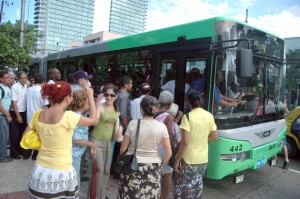 LA HABANA, Cuba, September, www.cubanet.org — With the 2013-2014 school year beginning, Havana’s public transport crisis is hard to overlook. Bus stops are already crowded with waiting passengers and the situation could become even worse in the coming weeks as students begin making increasing use of public transportation.
LA HABANA, Cuba, September, www.cubanet.org — With the 2013-2014 school year beginning, Havana’s public transport crisis is hard to overlook. Bus stops are already crowded with waiting passengers and the situation could become even worse in the coming weeks as students begin making increasing use of public transportation.
“After 2007, when the articulated buses came into service, the situation got a little better. Waiting time between buses was reduced to less than twenty minutes,” says Teresa, a route inspector in the Havana neighborhood Tenth of October. “But stops were still crowded and delays were longer than scheduled.”
On the Roundtable television show last July experts claimed the problem stemmed from the critical economic situation, which has led to almost half the buses serving the Cuban capital being idled.
Granma, the official newspaper of the Central Committee of the Communist Party, reported that at the last meeting of the Council of Ministers it was acknowledged that among the reasons fewer buses are in service are antiquated technology a shortage of spare parts, acts of vandalism and poor conditions in maintenance facilities and roadways.
The Havana Provincial Transport Agency announced that it will take steps to alleviate the situation. It has promised to reinforce inner-city public transportation along some routes in the capital. It is now providing the public with the well-known Russian-made “Giron” buses, which have survived three decades of marked decline in this sector. They will take the place of articulated and single-carriage buses made by the Chinese manufacturer Yutong.
Opinions indicate that transport workers and the average Cuban believe the island’s transportation system would benefit from a continued expansion of cooperatives beyond agricultural and into the urban transport sector. This includes cooperatives which would lease vehicles from the state as well as those that would offer technical assistance and vehicle repair services.
Guaguas* for five pesos
Examples of similar cooperatives are the so-called taxis ruteros. They offer more comfortable travel — some are even air-conditioned — for five pesos a ride.
Carlos, a laborer who works far from home, confesses, “I can’t afford this luxury. I have to make do with the one peso guagua. I make 315 pesos a month and, since I have to catch three guaguas to get to work, I have to watch what I spend.”
People like Carlos, who make barely ten pesos a day, cannot rely on the public transport system. If they want to avoid having what little they earn docked, they must get to work on time, which means leaving home up to three hours in advance.
In Cuba, public transport is a vital component in gauging the success of the “updating of the economic model” called for in the economic policy guidelines. This sector is almost completely funded through the state budget. This is the reason so many people blame the Cuban state for not meeting demand.
veizant@gmail.com
From Cubanet
September 3, 2013
Translator’s note: Pronounced wah-wah; Cuban slang for bus.
Political Prisoner Freed in Ciego de Avila / Juan Carlos Gonzalez Leiva
HAVANA, Cuba, September 6, 2013, Juan Carlos González Leiva / www.cubanet.org.- Political prisoner Daniel Camacho Marchena was released in Ciego de Avila earlier this week, according to what the former prisoner himself declared during a visit he made to the Council of Human Rights Rapporteurs after leaving prison.
He had been revoked and imprisoned on January 17, 2013, in the Canaleta Provincial Prison of Ciego de Avila, for writing anti-Castro signs on the public walls in the city saying: Down with Fidel and Raul!
Camacho Marchena was on parole because previously he was sentenced to four years in prison in joint sanction, which expired on August 29, 2013.
He is 43 years old and a member of the Council of Rapporteurs of Human Rights in Cuba and in the Municipal Democratic Circles.
He lives at No.93 D Street, between Maceo and H Castillo, Ciego de Avila.
Camacho is now in dire economic conditions. Making his situation worse is that he has a one-year-old child.
From Cubanet
About the author
 Juan Carlos González Leiva. Member of the Council of Rapporteurs of Human Rights in Cuba. A collaborator with Cubanet for several years.
Juan Carlos González Leiva. Member of the Council of Rapporteurs of Human Rights in Cuba. A collaborator with Cubanet for several years.
6 September 2013
The Seven Sides: From Above / Luzbely Escobar
Occasional photos… / Silvia Corbelle
Havanans Sound Off About the Visit of the Industriales to Miami / Ivan Garcia
 From my birth in 1965 until 1977, I lived in Romay, between Monte and Zequeira streets, less than ten blocks from Latinoamericano Stadium. I was 3 years old when my grandmother Carmen, a rare woman of peasant heritage who was a baseball fan, took me to the stadium two or three times a week. Admission was free, otherwise our modest family budget would not have allowed us to go that often.
From my birth in 1965 until 1977, I lived in Romay, between Monte and Zequeira streets, less than ten blocks from Latinoamericano Stadium. I was 3 years old when my grandmother Carmen, a rare woman of peasant heritage who was a baseball fan, took me to the stadium two or three times a week. Admission was free, otherwise our modest family budget would not have allowed us to go that often.
We went after lunch, so my grandmother just had to spend on coffee (she was a chain-smoker) and bread with croquette for me. All that cost 50 cents or less. On very special days she bought me a pizza. A native of Sancti Spiritus, she rooted for any Villa Clara team. I, a purebred Havanan, was always for the Industriales.
During the 70s, I sometimes went with Jorge Luis Piloto, then a neighbor in our building, today a renowned composer who has lived in Miami since 1980. He was born in Cárdenas, but when he moved to Havana he became a fan of the Blue Nine. I have not asked Jorge his opinion about the visit of ten Industriales to Miami, but I have asked ten friends, neighbors, and acquaintances.
It seems like a very good idea to everyone to mark the 50th anniversary of the debut of Industriales in the national classics, and now the immigration reform put into effect last February, with the old legends of the Blue Nine being allowed to travel to Florida, for fellowship and to make friendly stops.
Beyond the worn slogan that “we are one people,” if anything unites Cubans on both sides it is the passion for baseball. But the ten people I spoke to in person or by phone disagree on one point: the commemoration should have started in Havana in Cerro Stadium, home of the Industriales. And then moved to Miami.
They say, and I agree with them, that Latino Stadium would be filled to overflowing with fans of Industriales and other teams and provinces, to see the Duque Hernández, Agustín Marquetti, or René Arocha. They would also have appreciated the participation of Yadel Martí, Yunel Escobar and, of course, Kendrys Morales.
Although the media on the island have overlooked the visit to “the cradle of the mafia” by the players from the flagship team of the Cuban capital, the people manage to stay on top of every detail. Like the pall that fell on Miami with the presence of Javier Méndez and Juan Padilla. They even knew the answer that Padilla gave to a Herald reporter — that he had not come there to “talk about it.”
“It” was the beating that he, Méndez, and the Villa Clara catcher Ariel Pestano, inflicted on Diego Tintorero, a Cuban exile who came on the field with a sign asking for the release of political prisoners, during a game between Canada and Cuba as part of the Pan American Games in Winnipeg, in August 1999.
If Miami did not forget, neither did Havana. “Given the repercussions that incident had, we don’t know why the U.S. Interests Section gave visas to Padilla and Mendez. They behaved like thugs in Winnipeg. In Spain recently, a guy wanted to hug Neymar. There are specially hired security guards to prevent such activities, not athletes,” says an acquaintance from the neighborhood.
“Javier Mendez and Juan Padilla should not be part of the entourage,” says a taxi-driver friend, who recalls that some time later Alberto Juantorena boasted in an interview of having beaten Tintorero as he protested outside the Canadian stadium.
The bravado of Juantorena and the Cuban delegation to the Pan American Games in Winnipeg could not prevent the defection of the Pinar del Rio pitcher Danys Baez, then only 19 years old. Baez retired in 2012, with an excellent record.
A retiree, a self-styled sports historian, says: “They deliberately inserted Padilla and Mendez, it was a provocation.” And he showed me a paper documenting several acts of violence perpetrated by Cuban athletes in international events.
In 1962, to reject the athletes who defected from the 9th Central American and Caribbean Games that were held that year in Kingston, Jamaica, Fidel Castro said: “Give it hard to the worms.” Already in those Games, the weightlifting team assaulted a group of exiles who asked them to stay.
“What happened in Kingston was nothing compared with what happened in the 10th Central American Games, in San Juan, Puerto Rico in 1966,” says the retired chronicler. And he tells the story of Cerro Pelado. Better that the readers remember it in the documentary by Santiago Álvarez. A confrontation of the kind Castro always liked, in the best style of the Cold War.
There have been other violent incidents by athletes, coaches, and sports officials from Cuba. One of the most embarrassing happened in the 2008 Beijing Olympics, as recounted in the Spanish newspaper El País: “The Cuban taekwondo athlete Angel Valodia Matos and his coach were banned for life from all sports competitions after the former assaulted the referee after being disqualified in the bronze-medal match against Kazakhstan’s Arman Chilmanov, and the coach yelled that ’the referee was paid off.’ Valodia was disqualified (while winning 3-2 in the second period) because he exceeded the one minute available for medical attention after suffering a blow to the foot.”
The presence of Juan Padilla and Javier Mendez in Miami and their refusal to publicly apologize for the beating Dyer does not help ease tensions. When it is convenient, the regime turns the page. Or tries to let it pass. This has not been the case.
Florida-bound trips, temporary or permanent, by artists, musicians, intellectuals, and now by dissidents and athletes, are in full swing. The rope of Cuban-American exchange is still pulling in one direction. It’s time to also pull in the opposite direction.
Iván García
Photo: Taken from the blog of Villa Granadillo.
1 September 2013
Compulsory Purchase. What for? / Noel Rodriguez Avila
Our present work is concentrating on the processes of compulsory purchase (forced expropriation) against the owners of motor vehicles transporting freight from the provinces of Holguín and Las Tunas.
Before they started this, in the extinct transport sectors, they created commissions for the buying and selling of trucks, which followed the express instructions of the Ministry of Transport in regard to inspecting the vehicles in question, to detect anything illegal done by their owners in terms of parts, components, accessories or engine units.
Once they had finished the inspection, they wrote out a report on the deficiencies they had detected; afterwards they gave the owner a document directing him to sell his vehicle, for which they paid by cheque in the payee’s name in national money for the value of $1800 or $2500, depending on the tonnage.
This transaction was covered by an ambiguous, corrupt and one-sided contract of sale authorized by Resolution 118-88 of the Ministry of Transport, the law 1090/63, complemented by the law 1148/64, and the law 1206/67, which entitled the Central Administration entities of the state to acquire the assets required for the taking forward of their activities; giving rise to a situation in which, on the presentation of demands before the Civil and Administrative Chamber of the Provincial Tribunals, the sale was Held to be Null and Void because of the exclusion of the spouse’s interest.
In those cases where the vehicle’s owner refuses to effect the sale, the process of compulsory purchase is commenced; a procedure which is instituted in our legal and constitutional system, ensured both by the Constitution of the Republic in Art. 25 and also in Arts. 425 et seq. of the Law of Civil, Administrative, Employment and Economic Procedure; being the prerequisite which mediates the declaration of public necessity and social interest.
On that basis the Ministry of Transport issued Resolutions number 40 and 85, which declared the public necessity and social interest in acquiring the said vehicles which were operating in the eastern area, in order that the Holguín Truck Company could achieve its transport plans. Looking back, it is clear that the objective of this process was to get rid of the private sector.
This view is backed up by an legal Opinion issued by the legal directorate of the Ministry of Transport, in relation to a complaint presented by truckers from the province of Holguín addressed to Raúl Castro Ruz, who was at that time Second Secretary of the PCC (Communist Party of Cuba) and Minister of the FAR Revolutionary Armed Forces); in which, among other things, there is the following reference: The compulsory purchase of trucks, initiated against their owners, has its antecedents in the year 1989, when, on the orders of the high command of the country they made available what was termed “The policy of making things harder for the private sector, with a view to its gradual disappearance”, reflected in agreement no. 1507 of the Secretariat of the Central Committee of the PCC …
We can therefore conclude that:
Firstly: The private carriers were grouped in the defunct Fleet Operator, from where they offered their transport services, both to private individuals and companies, as well as the Central Administration of the State.
Secondly: That the Ministry of Transport secured, employing anticipated alleged technical violations and by way of a corrupt contract of sale, the compulsory purchase, with no voluntary aspect at all, of private sector trucks, resulting in the later nullification of these legal transactions.
Thirdly: That the State disguised its true intentions, aided by a false declaration of public necessity and social interest, when its real interest was to get rid of the private sector.
Fourthly: Today it remains clear that this sector represents a great public utility and is in the social interest, as the state has had to turn to the private carriers in order to sort out the situation with the transport of passengers and goods on a national level.
Therefore it would be good to get a reply to the question in the title: Compulsory purchase: Why and what for?
Translated by GH
26 August 2013
Jose Conrado: “I ask Pope Francisco to be firm with the rulers.” / Ramiro Pellet Lastra
An interview with Father José Conrado, from Cuba, by La Nacion newspaper.

By Ramiro Pellet Lastra | LA NACION
José Conrado describes himself as a “small-town priest.” But from his parish in Santiago de Cuba, or in the colonial city of Trinidad, to where he was transferred, he throws verbal darts with a “language of the barricade” against corruption, repression, and other hallmarks of the Cuban government. Close to the dissident movements, Conrado has suffered pressure, aggression and even exile. But he has continued denouncing the leadership of his country, as in this dialogue with LA NATION newspaper, during a visit to Buenos Aires, after attending the World Youth Day in Rio de Janeiro.
Conrado only set aside denunciation in favor of enthusiastic praise when he analyzes Francisco‘s performance at the head of the Church, a man he trusts, and whom he hopes that “when Dilma, Cristina, or whoever goes to kiss his hand, he tells them the truth.”
How do you see the Cuba of today?
– Cuba is a bankrupt country, economically and morally bankrupt. From a family point of view, it’s an eroded country. There is not a single Cuban who doesn’t have relatives abroad, including Fidel Castro, who has several grandchildren and a daughter outside of Cuba as political exiles. It is a country where everyone, for one reason or another, has suffered the imprisonment of a family member, the death of a family member, in front of a firing squad or in the Straits of Florida. It’s a country with a history of political imprisonment.
-Why in Latin America there are those who still have a good image of the Castro regime?
-I think there is a certain complicity of the Left that wants to see Cuba as paradisiacal paradigm of what Revolution is and what social accomplishments are. There is also an ongoing press campaign on the part of the Cuban government. And there are the visitors to Cuba, because tourists see Cuba from air-conditioned buses and from five-star hotels.
-People came out into the streets to protest in many countries, democratic and non-democratic, but they did not do it in Cuba.
-People in other countries saw a space for freedom that made them decide to forget the spaces of their fear. We haven’t yet gotten to that point. I believe we have a point where this will happen, but we aren’t there yet. In Cuba, a popular saying goes: There’s not one to turn the government over to, but nor is there anyone who can fix it. Everyone in Cuba knows we must have change. It is a silent and unanimous agreement among all Cubans.
Will perhaps a minor incident light the fuse like in the “Arab Spring”?
-Yes, that could happen. I think the government stays away from large crowds. They don’t have as many large demonstrations as before. I think the government has been very astute to not permit acts of unchecked violence on the part of the police. I think that people would throw themselves into the street [if such acts happened].
-And in this context, what prospects does the government have?
-The seriousness of the situation is forcing the government to think of another way out. Today they are proposing that those whom they always considered their eternal and bitter enemies, Cubans in exile, invest in Cuba..
As a Latin American priest, how did you experience the election of Pope Francisco?
-Francisco is a gift from God for a time of crisis. He is man who is above the conventions of the left and the right, because he goes for the essential, and the essential is God and the people who are suffering. Pope Francisco knows that he is a servant.
-Could he influence not only for Cuba, but for democracies in trouble?
-I think that he is going to have great influence, because the Church needs a reform from within. How is he going to preach to the politicians not to steal otherwise? A Church renewed from within is an example for these men who have great responsibilities.
-In addition to being an example, could Francisco influence through his discourse, through direct denunciation?
-Yes, of course. I don’t ask the Holy Father to speak the language of the barricade, like I, a small town priest, do, but I do ask him to be very firm with the rulers. That when Dilma, Cristina, or whoever goes to kiss his hand, he tells them the truth.
Translated by: Ernesto Ariel Suarez
1 August 2013
Prison Diary LIV: The Uselessness of Cuban Journalism / Angel Santiesteban
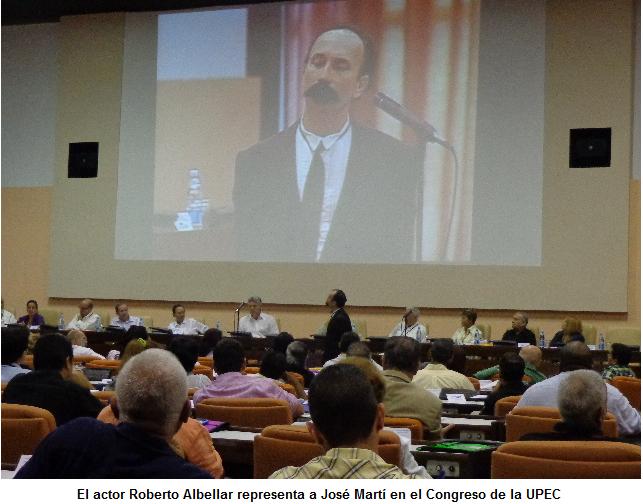
The actor Roberto Albellar playing José Martí at the Congress of the Union of Cuban Journalists (UPEC)
On national television, with great fanfare and bombast, they present the approaches of the IX Congress of the Union of Cuban Journalists (UPEC), the most useless group in the country, among the many unproductive institutions on the Island, which, for more than half a century, has bowed before the designs of the Castro dictatorship.
It’s not new that the news items are selected by the Ideological Department of the Council of State, then are passed on to the newspapers which publish them in their own way, according to the journalists that write them. It is also known that for any spot to appear on TV, it has to pass the censorship filter of the Commission that analyzes it, sending it on the Ideological Department, and waiting for the response.
Each radio program in the country, has a consultant who is responsible for reviewing the scripts and deciding what is acceptable to air and what is not.
With regards to the publishers it’s the same, in fact, for my books they’ve published they had to be award winners, they never accepted a book from me that hadn’t won a prize, as for my rebellious literature… but that’s another story.
I remember that with the writer and career journalist, Amir Valle, Tubal Paez Hernandez, President of UPEC, rejected his membership for being rebellious, and his testimonial book Havana-Babylon was snatched the Casa de las Americas Prize for its content of social reporting, which is supposed to be the main reason for being a journalist.
In the small spaces of “debate” in the IX UPEC Congress that have been televised, it was a shame to see journalists as if they were recent graduates, inexperienced yet feeling their way — and yet already with gray hair — saying with apparent naiveté, “that the revolution needs a more effective journalism, persuasive, aggressive.”
With these words, years ago, they were thrown out of their jobs without recourse, for not being politically reliable, stopped in their professional development, their social status deteriorating, along with their ability to travel, their salary, etc, in short, the Cuban “journalist” was crushed, humiliated, intimidated, made timid.
And now, to cover up these hard times, in this Congress they have been allowed to say ridiculous things, like that the computers are archaic, the Internet connection is inadequate, as if they were asking for Christmas presents. They still don’t understand that they shouldn’t give us anything, that our intellect should acquire what’s needed, that our labor should be enough to earn us what belongs to us. But that will be for a tenth Congress, that — with any luck — we will hold in freedom, without a dictatorship, where we can, like journalists, writers, bloggers, chroniclers, correspondents, say what our conscious demands.
Ángel Santiesteban
Prison 1580
July 2013 / Published in this blog on 6 September 2013
Vacations / Regina Coyula
The school year is just beginning, the children chat about their vacations. Samantha and Yenny show their tans from Varadero; Jorgito learned to dive with a mask and snorkel in Cayo Santa Maria; Barbarita spent almost two months with her cousins in Bayamo and there she made a ton of new little friends; Heriberto, thanks to his grandfather, discovered stamp collecting, and also spent a week in camping in El Abra. But what caused a sensation were Mayrilis’s vacation photos; with Mickey in front of the Princess Castle, in Universal Studios, in a fantastic water park… Mayrilis enjoyed a week in Disney World. She brought back a pink backpack with a matching lunchbox and many more gifts, but her mom didn’t allow her bring them to school.
Without looking at Mayrilis’s camera, also pink, Hector was not impressed. He and Yasmany built a chivichana (a homemade “soapbox” racer) and his mother brought them to the coast a ton of times, where they learned to fish with the flesh of earthworms. The bad thing was the walk back up the high hill, now without water in the water bottle.
5 September 2013
Cooperatives: Like the Cries of the Dying / Jose Hugo Fernandez
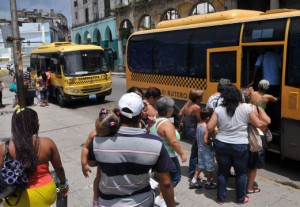 HAVANA, Cuba, August, www.cubanet.org — A very brief stop at a Havana park, El Curita (at the corner of Reina and Galiano streets), provides enough time to gauge the opinions of riders of the new public transport cooperative that serves the Havana-Boyeros-Santiago de las Vegas corridor, among the most populous in the capital. In general the consensus is that the fleet of small buses that serve this route were operating better before the switch to cooperative management even though, to much dismay, there has been no subsequent reduction in fare.
HAVANA, Cuba, August, www.cubanet.org — A very brief stop at a Havana park, El Curita (at the corner of Reina and Galiano streets), provides enough time to gauge the opinions of riders of the new public transport cooperative that serves the Havana-Boyeros-Santiago de las Vegas corridor, among the most populous in the capital. In general the consensus is that the fleet of small buses that serve this route were operating better before the switch to cooperative management even though, to much dismay, there has been no subsequent reduction in fare.
Since these buses were managed directly by the state before being taken over by the cooperative, we can already compare how good service was just a short time ago versus how bad it is today.
In Artemesia, one of the other provinces chosen as a test site for cooperative management of public transport, the flood of complaints from riders attracted the attention of the independent press. Meanwhile, the cooperative members themselves, who have been on the job barely a month, cite basic shortages (they rent rather than own their vehicles and do not have access to wholesale markets) as justification for the poor service and changes in ticket prices.
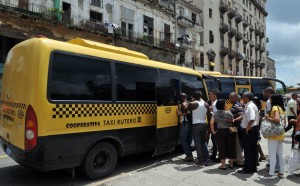 Cuba’s bigwigs believe these “new” cooperatives will provide the magic formula for completing the latest phase of their totalitarian dictatorship without embarrassment.
Cuba’s bigwigs believe these “new” cooperatives will provide the magic formula for completing the latest phase of their totalitarian dictatorship without embarrassment.
Looking at it from the standpoint of the world’s fatuous leftists — which is to say as a means for creating new social and economic relationships based on equality, mutual aid and solidarity — the cooperative movement must seem like manna from heaven. The hope is that it will revitalize the regime’s goal of being able to remain masters of all they surmise while simultaneously making it look as though they are seeking innovative ways of raising efficiency and productivity through a clever process of economic decentralization.
Anyone feeling bewildered by the avalanche of prohibitions and assaults with which the regime harasses the self-employed — taking place just at the moment when many had hoped it would support and even promote their activities — might well find their confusion summed up in one word: cooperatives. The bigwigs have realized that they need not run of risk of privatization (even on a small scale), or even of small business development, which one way or another always leads to free thinking and independence.
By creating cooperatives, the bigwigs hope to make everyone believe (to use another well-worn phrase from Lampedusa) that things are changing even as everything remains the same. And so naively convinced are they that their plan is working that they feel they have the luxury of dismissing and marginalizing the self-employed — the only group that, for better or worse, was proving capable of pulling their chestnuts out of the fire.
Like the cries of a dying man, they are now publicizing, as they typically do, the existence of 124 cooperatives which have been operating since July 1 in sectors such as transport, construction, trash collection and farmers’ markets.
 Of course, the project is part of the charming “updating of the economic model,” which has been summed up in black and white and embalmed in what is known as the Guidelines of the Sixth Congress of the Cuban Communist Party. One of its chief promoters is Grisel Tristá, whose position carries the mile-long title Chief of the Group for Corporate Perfection of the Permanent Commission for Implementation and Development. She has charmingly and quite literally stated that cooperatives “allow the state to divest itself of responsibilities that are not of transcendental importance to economic development.”
Of course, the project is part of the charming “updating of the economic model,” which has been summed up in black and white and embalmed in what is known as the Guidelines of the Sixth Congress of the Cuban Communist Party. One of its chief promoters is Grisel Tristá, whose position carries the mile-long title Chief of the Group for Corporate Perfection of the Permanent Commission for Implementation and Development. She has charmingly and quite literally stated that cooperatives “allow the state to divest itself of responsibilities that are not of transcendental importance to economic development.”
However, another expert — the president of the Society of Cooperatives of the National Association Cuban Accountants and Economists, Alberto Rivera — was talking no less charmingly about the need to train the public to understand that the promotion of these cooperatives represents a deceptive hoax. Rivera believes they were intended to serve somewhat like spare tires and were given only a passive, short-term role. True cooperatives (even as perceived by the world’s leftists) would be fundamentally incompatible with the bureaucratic, anti-democratic and suffocating nature of the Cuban regime.
What is most laughable about this is all the clucking by the official press over the publicity surrounding this issue. They insist that cooperatives are being set up with the desire and support of their members.
Of the first one hundred twenty-four that have been set up, one hundred twelve started out as state-owned businesses. This is another way of saying they were failed, insolvent enterprises headed by corrupt, inept administrators who later automatically became presidents of their cooperatives. Only twelve started out in the private sector, established, it is said, by self-employed individuals.
Rogelio Regalado, member of another organization called the Commission for the Implementation of the Reforms, has clearly described how certain bankrupt state enterprises underhandedly manipulate their workers by suggesting that they “voluntarily” become partners in a cooperative, telling them, “If there are no workers willing to become partners, the property and assets are liable to be auctioned off.”
Two hundred twenty-two small and medium sized state businesses — all problematic, unproductive and in crisis — were converted to cooperatives which are in theory fully autonomous. A wide range of services — including fresh fruit markets, restaurants and even shrimp farms — will come under this new form of management for which they have already coined the charming slogan “economic solidarity.” In other words, there will be more of the same.
It is a ruse intended to delay access to private property while they still can so as to hamper the country’s real agents of economic progress. This makes a mockery of consumers — in other words the public — which cannot find alternatives to satisfy their own demands and instead must continue subsidizing those of their exploiter, which is to say the regime.
About the author
 José Hugo Fernández is an author whose works include the novels The Suicide Clan, The Crimes of Aurika, Butterflies Don’t Flutter on Saturday and The Parable of Bethlehem and the Shepherds. He is also the author of two short story collections, The Island of Blackbirds and I Who Was the Streetcar Desire, as well as a collection of essays, Shadows Against the Wall. He lives in Havana, where he has worked as an independent journalist since 1993.
José Hugo Fernández is an author whose works include the novels The Suicide Clan, The Crimes of Aurika, Butterflies Don’t Flutter on Saturday and The Parable of Bethlehem and the Shepherds. He is also the author of two short story collections, The Island of Blackbirds and I Who Was the Streetcar Desire, as well as a collection of essays, Shadows Against the Wall. He lives in Havana, where he has worked as an independent journalist since 1993.
From Cubanet
28 August 2013
